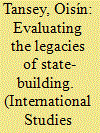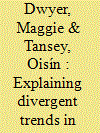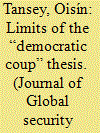|
|
|
Sort Order |
|
|
|
Items / Page
|
|
|
|
|
|
|
| Srl | Item |
| 1 |
ID:
131008


|
|
|
|
|
| Publication |
2014.
|
| Summary/Abstract |
What impact do international state-building missions have on the domestic politics of states they seek to build, and how can we measure this impact with confidence? This article seeks to address these questions and challenge some existing approaches that often appear to assume that state-builders leave lasting legacies rather than demonstrating such influence with the use of carefully chosen empirical evidence. Too often, domestic conditions that follow in the wake of international state-building are assumed to follow as a result of international intervention, usually due to insufficient attention to the causal processes that link international actions to domestic outcomes. The article calls for greater appreciation of the methodological challenges to establishing causal inferences regarding the legacies of state-building and identifies three qualitative methodological strategies-process tracing, counterfactual analysis, and the use of control cases-that can be used to improve confidence in causal claims about state-building legacies. The article concludes with a case study of international state-building in East Timor, highlighting several flaws of existing evaluations of the United Nations' role in East Timor and identifying the critical role that domestic actors play even in the context of authoritative international intervention.
|
|
|
|
|
|
|
|
|
|
|
|
|
|
|
|
| 2 |
ID:
177066


|
|
|
|
|
| Summary/Abstract |
Coups and mutinies have often been treated as broadly equivalent types of behavior. However, they are distinct forms of indiscipline carried out by different sets of actors and have fundamentally distinct goals. This article makes two contributions to the scholarship on both coups and mutinies. First, we offer the first systematic attempt to compare their rates and illustrate the difference in their frequency over time, drawing on data from West and Central Africa. In particular, we identify a striking divergence in the frequency of coups and mutinies over time as well as a set of fluctuations that coincide with the end of the Cold War. Second, we build a new theory to explain these divergent trends. We focus on the role of agency within the military and argue that the upheavals associated with the end of the Cold War were experienced in different ways by junior and senior ranks within armed forces. This, in turn, helps account for variation in the coup and mutiny attempts.
|
|
|
|
|
|
|
|
|
|
|
|
|
|
|
|
| 3 |
ID:
147489


|
|
|
|
|
| Summary/Abstract |
Recent studies have suggested that post–Cold War coups are more likely to be followed by democratic elections than their Cold War predecessors; analysts attribute this trend to international policies of democratic conditionality. Some go so far as to argue that we live in an age of the “democratic coup.” This paper raises questions over any optimistic view of the capacity of coups to contribute to long-term democratization. An analysis of countries’ post-coup trajectories after 1991 demonstrates that there is, consistent with previous studies, a clear trend of holding elections within five years of the coup. However, I show that most countries experiencing coups fail to go on to establish high-quality democratic rule. Instead, they often consolidate into some form of authoritarian rule. The paper ratifies the importance of the international political environment but highlights the role of international autocratic sponsors. When states are strategically important or have strong linkages to non-Western autocracies, coup leaders are likely to receive international support and protection rather than condemnation and sanctions. The article illustrates these arguments by examining post-coup authoritarian consolidation in Egypt and Fiji.
|
|
|
|
|
|
|
|
|
|
|
|
|
|
|
|
| 4 |
ID:
159206


|
|
|
|
|
| Summary/Abstract |
After the end of the Cold War, states and international organizations increasingly adopted a new “anti-coup norm.” However, this norm has evolved unevenly and has never been universally embraced or consistently enforced. In this article, I examine the uneven evolution of the anti-coup norm by tracing its fate within the United Nations system. I show how member states have sought to retain discretion in how they respond to individual coup cases and how, in response, UN officials within the Secretariat sought to pursue norm institutionalization by changing the UN's internal rules and procedures for dealing with coup countries. In doing so, they pursued “lowest common denominator” norm institutionalizsation, which involves seeking to achieve the highest level of institutionalization possible even if it means aiming for a lower level of progress than norm promoters would ideally like.
|
|
|
|
|
|
|
|
|
|
|
|
|
|
|
|
|
|
|
|
|